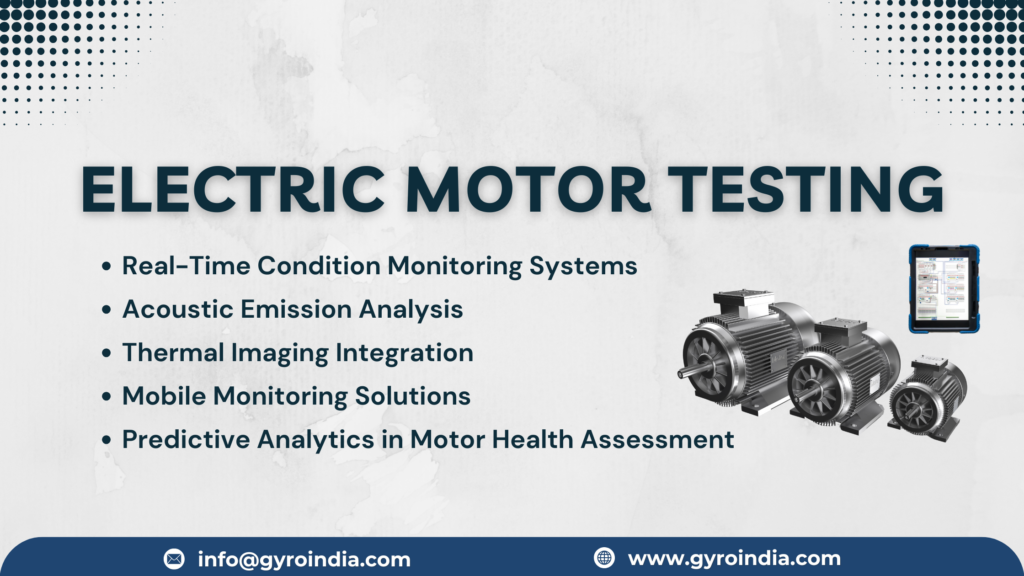Electric Motor Testing: Advanced Tools for Health Monitoring
 The Evolution of Motor Testing Technologies
The Evolution of Motor Testing Technologies
Modern motor testing has transformed from basic diagnostic procedures into sophisticated, data-driven performance analysis systems. Industrial manufacturers and automotive engineers now leverage cutting-edge monitoring tools to ensure optimal motor efficiency and longevity. Advanced testing equipment combines artificial intelligence with precision sensors to deliver unprecedented insight into motor health.
Key Components of Modern Motor Testing
Real-Time Condition Monitoring Systems
Today’s motor testing equipment provides continuous performance tracking through integrated sensor networks. These sophisticated systems monitor crucial parameters including temperature variations, vibration patterns, and current consumption in real-time. Engineers can detect potential issues before they escalate into costly failures, significantly reducing maintenance downtime.
Smart sensors embedded throughout the motor assembly collect vital performance data:
- Thermal distribution patterns
- Bearing vibration signatures
- Current draw fluctuations
- Rotational speed variations
- Power consumption metrics
Predictive Analytics in Motor Health Assessment
Machine learning algorithms revolutionize motor testing by analyzing historical performance data to predict potential failures. These intelligent systems learn from operational patterns and can identify subtle changes that might indicate developing problems. Automotive and industrial manufacturers use these insights to optimize maintenance schedules and extend motor life.
Advanced Testing Methodologies
Acoustic Emission Analysis
Modern motor testing incorporates sophisticated acoustic monitoring tools that detect microscopic changes in motor operation. These systems capture and analyze sound signatures that might indicate:
- Bearing wear patterns
- Alignment issues
- Internal component stress
- Mechanical interference points
Thermal Imaging Integration
Advanced infrared cameras and thermal sensors provide detailed heat distribution maps during motor operation. This technology enables engineers to:
- Identify hotspots in real-time
- Monitor thermal stress patterns
- Detect insulation breakdown
- Assess cooling system efficiency
Data-Driven Decision Making
Contemporary generates vast amounts of performance data that inform maintenance strategies. Cloud-based analytics platforms process this information to provide:
- Detailed performance trending
- Predictive maintenance schedules
- Efficiency optimization recommendations
- Component lifetime projections
Mobile Monitoring Solutions
Modern motor testing has gone mobile with sophisticated smartphone-based diagnostic tools. Engineers can now:
- Access real-time performance data
- Receive instant alert notifications
- Share diagnostic information
- Coordinate maintenance responses
Industry-Specific Applications
Automotive Sector Implementation
Electric vehicle manufacturers utilize advanced systems to ensure optimal drivetrain performance. These tools help:
- Validate motor efficiency
- Monitor thermal management
- Assess power delivery
- Optimize energy recovery systems
Industrial Manufacturing Applications
Factory automation systems benefit from comprehensive protocols that ensure continuous operation. Advanced monitoring helps:
- Maintain production efficiency
- Reduce unexpected downtime
- Optimize energy consumption
- Extend equipment lifetime
Future Trends in Motor Testing
The evolution continues with emerging technologies that promise even greater insight into motor health. Developments include:
- Quantum sensor integration
- AI-powered diagnostic systems
- Augmented reality visualization
- Blockchain maintenance tracking
Integration with Industrial IoT
Smart factories increasingly integrate systems with broader IoT networks. This connectivity enables:
- Automated performance optimization
- Real-time efficiency tracking
- Predictive maintenance scheduling
- Cross-system performance analysis
By embracing these advanced motor testing technologies, manufacturers can significantly improve operational efficiency and reduce maintenance costs. The future lies in increasingly sophisticated, integrated monitoring systems that provide unprecedented insight into motor health and performance.

Leave a Reply